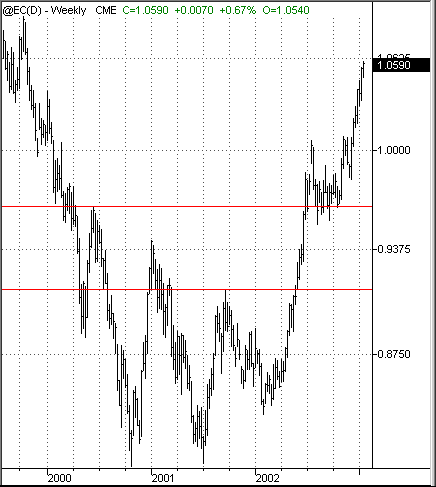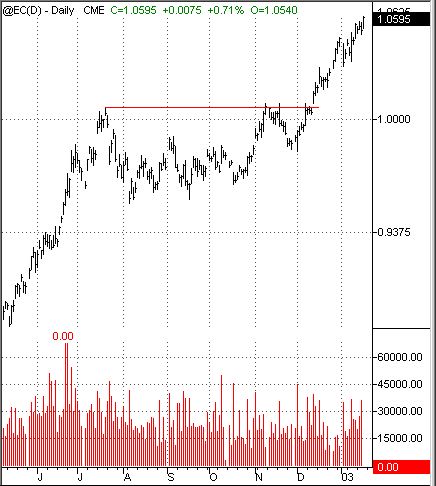
HOT TOPICS LIST
- MACD
- Fibonacci
- RSI
- Gann
- ADXR
- Stochastics
- Volume
- Triangles
- Futures
- Cycles
- Volatility
- ZIGZAG
- MESA
- Retracement
- Aroon
INDICATORS LIST
LIST OF TOPICS
PRINT THIS ARTICLE
by David Penn
The greenback's loss has been the euro's gain.
Position: N/A
David Penn
Technical Writer for Technical Analysis of STOCKS & COMMODITIES magazine, Working-Money.com, and Traders.com Advantage.
PRINT THIS ARTICLE
CONSOLID FORMATION
The Euro's Cup with Handle Breakout
01/17/03 08:28:46 AMby David Penn
The greenback's loss has been the euro's gain.
Position: N/A
| The decline of the US dollar was among the more significant economic events of 2002. Despite some early bullishness among many mainstream financial commentators in January 2003, the greenback was having none of it. On January 2, 2003, the US dollar index was just above 102. By mid-month, the Index was barely above 100. While a relatively small move in and of itself, the fact that this latest decline comes in the wake of the Index's heart-in-throat, year 2002 plunge from 119 puts the Index squarely in a bearish context. |
| So what has been gaining at the dollar's expense? A number of commodities enjoyed healthy 2002s--not the least of which have been energies like natural gas (see my article "Reversals, Price Channels and Candlesticks" Traders.com Advantage, 01/07/03). But the dollar has been declining against currencies as well, as recent bullishness in the euro makes plain. |

|
| Figure 1: Note how the cup with handle formation develops at the resistance-turned-support level of 0.9644. |
| Graphic provided by: TradeStation. |
| |
| The long-term euro chart shows most importantly the bottoming process the European currency experienced between the fall of 2000 and the spring of 2002, when the euro--as measured by continuous futures--broke out above an important resistance level of 0.9127 left over from a failed late summer rally in 2001. The euro spent virtually all of 2002 in bull market mode, beginning the year at about 0.8736 and finishing up in December at 1.0471, a 17 cent advance that represented a gain of more than 19%. The most impressive part of this rally came in the second half of 2002 as the euro used a cup with handle formation to consolidate above key resistance and push to highs not seen since 1999. |
 Figure 2: This cup with handle formation lasted five months and is sending the euro on a two-month ride toward a target of 1.0608. Cup with handle formations are among the more popular chart patterns--especially after they were noted so positively by William O'Neil in his investment classic, How to Make Money in Stocks. The cup with handle formation consists of a scalloped cup--here, the decline from July 2002 to the rally in late October/early November--and a second, shorter dip referred to as the handle--here, the decline in the second half of November and the rally in the first half of December. While cup with handle formations can appear as bottoms, they are most generally thought of as bullish continuation patterns signaling future advances. |
| The measurement rule for cup with handle formations is a variation of the "swing rule" noted by Stan Weinstein (Secrets for Profiting in Bull and Bear Markets). This rule calls for adding the size of the formation--essentially from resistance at the top of the cup to support at the bottom of the cup--to the value at the top of the formation. Here, a formation size of 0.0538 added to the value at the top of the formation (1.0070) provides for an upside target of about 1.0608, which is in the neighborhood of the euro's current high (again, as measured by continuous futures). Although such upside targets are generally considered minimum moves, it is worth noting that the majority of the breakout from this particular formation has already occurred--and that cautious traders may want to wait for a pullback or another consolidation before jumping in on the long side. |
Technical Writer for Technical Analysis of STOCKS & COMMODITIES magazine, Working-Money.com, and Traders.com Advantage.
| Title: | Technical Writer |
| Company: | Technical Analysis, Inc. |
| Address: | 4757 California Avenue SW |
| Seattle, WA 98116 | |
| Phone # for sales: | 206 938 0570 |
| Fax: | 206 938 1307 |
| Website: | www.Traders.com |
| E-mail address: | DPenn@traders.com |
Traders' Resource Links | |
| Charting the Stock Market: The Wyckoff Method -- Books | |
| Working-Money.com -- Online Trading Services | |
| Traders.com Advantage -- Online Trading Services | |
| Technical Analysis of Stocks & Commodities -- Publications and Newsletters | |
| Working Money, at Working-Money.com -- Publications and Newsletters | |
| Traders.com Advantage -- Publications and Newsletters | |
| Professional Traders Starter Kit -- Software | |
Click here for more information about our publications!
Comments
Date: 01/21/03Rank: 3Comment:

Request Information From Our Sponsors
- StockCharts.com, Inc.
- Candle Patterns
- Candlestick Charting Explained
- Intermarket Technical Analysis
- John Murphy on Chart Analysis
- John Murphy's Chart Pattern Recognition
- John Murphy's Market Message
- MurphyExplainsMarketAnalysis-Intermarket Analysis
- MurphyExplainsMarketAnalysis-Visual Analysis
- StockCharts.com
- Technical Analysis of the Financial Markets
- The Visual Investor
- VectorVest, Inc.
- Executive Premier Workshop
- One-Day Options Course
- OptionsPro
- Retirement Income Workshop
- Sure-Fire Trading Systems (VectorVest, Inc.)
- Trading as a Business Workshop
- VectorVest 7 EOD
- VectorVest 7 RealTime/IntraDay
- VectorVest AutoTester
- VectorVest Educational Services
- VectorVest OnLine
- VectorVest Options Analyzer
- VectorVest ProGraphics v6.0
- VectorVest ProTrader 7
- VectorVest RealTime Derby Tool
- VectorVest Simulator
- VectorVest Variator
- VectorVest Watchdog
